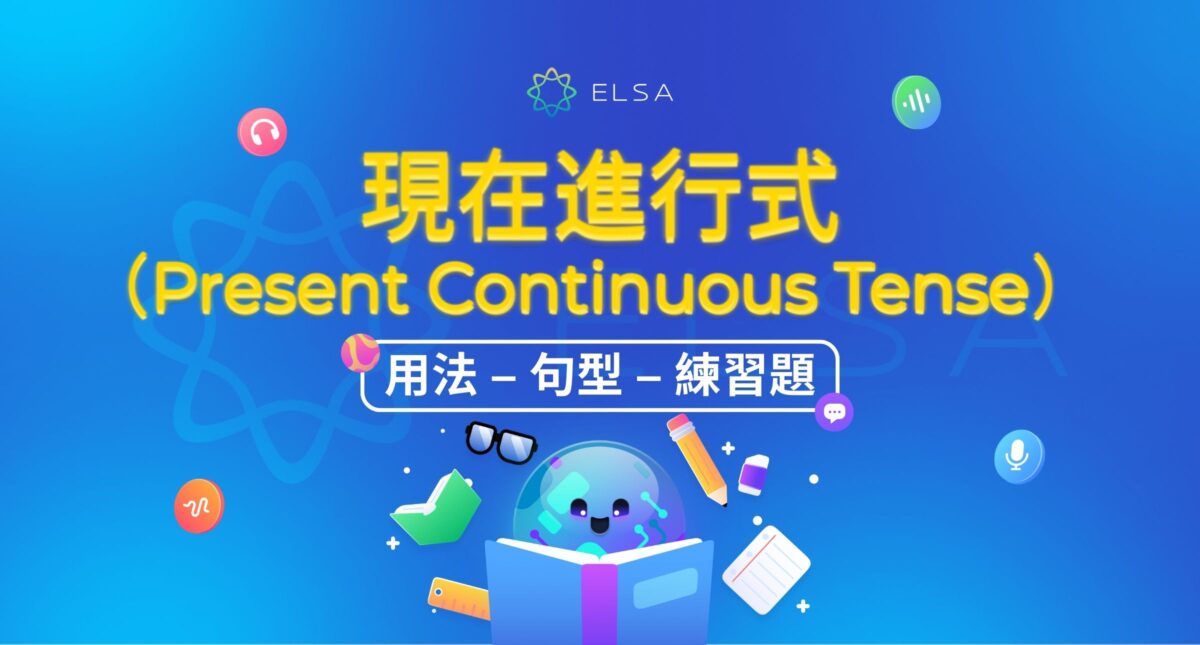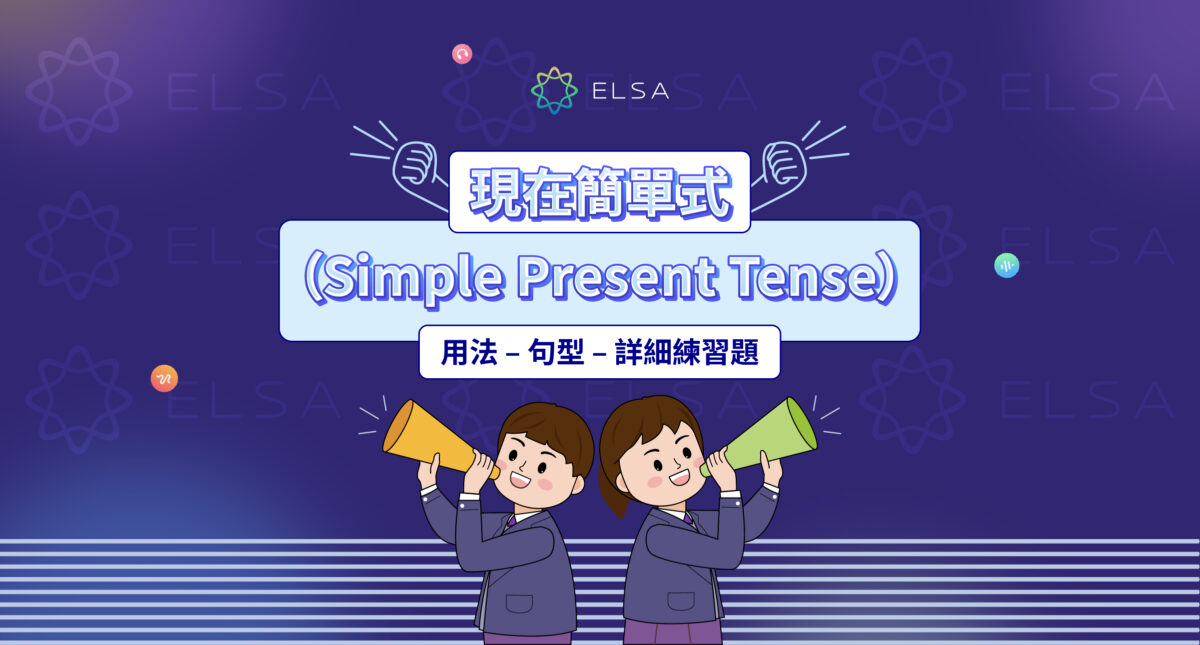英文時態有幾種呢?英語有 12 種基本英文時態,有不同的結構、識別標誌和用法。為了幫助你輕鬆學習和掌握知識,ELSA Speak 爲你提供了英文時態文法整理以及英文時態圖解,並附有英文時態練習。
現在簡單式 – Present Simple Tense

現在簡單式 (Present Simple Tense) 是基本英文時態,用來描述頻繁的、重複的動作、習慣、明顯的事實或固定的情況。
現在簡單式的公式
| 句式 | 常規動詞的結構 | “To be”動詞的結構 |
|---|---|---|
| 肯定句 | S + V(s/es) + O. | S + am/is/are + O. |
| 否定句 | S + do not/does not + V-ing. | S + am not/is not/are not + O. |
| 疑問句 | Do/Does + S + V-ing? 疑問詞 + do/does + S + V-ing? | Am/is/are + S + O? 疑問詞 +am/are/is + S? |
現在簡單式的用法
| 用法 | 例句 | 翻譯 |
|---|---|---|
| 真相,顯而易見的真相 | The sun rises in the east. | 太陽從東方升起。 |
| 習慣、興趣、觀點 | She loves reading books every evening. | 她喜歡每天晚上看書。 |
| 頻繁的動作、重複的習慣 | He goes to the gym three times a week. | 他每週去三次健身房。 |
| 想法、情緒、感覺、靜態 | I think this movie is amazing. | 我認為這部電影非常精彩。 |
| 能力 | She plays the piano beautifully. | 她鋼琴彈得很好。 |
| 指示或說明 | You turn left at the next traffic light. | 你在下一個紅綠燈左轉。 |
| 未來的計劃已經制定好 | The train leaves at 7 PM tomorrow. | 火車明天晚上七點出發。 |
現在簡單式的識別標識
頻率副詞
| 標識 | 例句 | 翻譯 |
|---|---|---|
| always | I always drink coffee in the morning. | 我總是早上喝咖啡。 |
| constantly | She is constantly checking her phone. | 她不斷地檢查她的手機。 |
| usually | They usually go to the park on Sundays. | 他們通常在周日去公園。 |
| often | He often eats at this restaurant. | 他常在這家餐廳吃飯。 |
| frequently | We frequently travel for work. | 我們經常出差。 |
| sometimes | Sometimes, I like to read a book at night. | 有時,我喜歡在晚上看書。 |
| rarely | I rarely watch TV. | 我很少看電視。 |
| seldom | She seldom goes out at night. | 她晚上很少出去。 |
| never | They never visit us anymore. | 他們永遠不會來拜訪我們了。 |
表示時間的詞組
| 時間標志 | 例句 | 翻譯 |
|---|---|---|
| every day/week/month/year | I work every day. | 我每天都工作。 |
| on Mondays | On Mondays, I have meetings. | 週一我有會議。 |
| in the morning/afternoon/evening | I go for a walk in the evening. | 我晚上去散步。 |
狀態/情感動詞
| 特殊動詞標識 | 例句 | 翻譯 |
|---|---|---|
| 識別標識 | 例子 | 翻譯 |
| like | I like to listen to music. | 我喜歡聽音樂。 |
| love | She loves to read books. | 她喜歡看書。 |
| hate | They hate waking up early. | 他們討厭早起。 |
| want | I want to go on vacation. | 我想去度假。 |
| need | We need to study for the exam. | 我們需要為考試而學習。 |
| believe | I believe in hard work. | 我相信努力工作。 |
| know | She knows how to play the piano. | 她會如何彈鋼琴。 |
| understand | I understand the problem now. | 我現在明白這個問題了。 |
| mean | What does this word mean? | 這個詞是什麼意思? |
現在進行式 – Present Continuous Tense

現在進行式 (Present Continuous Tense)是英文時態,用於描述說話時正在發生的動作或臨時動作/事件。
現在進行式的公式
| 句式 | 結構 |
|---|---|
| 肯定句 | S + am/is/are + V-ing. |
| 否定句 | S + am/is/are not +V-ing. |
| 疑問句 | Am/Is/Are + S + V-ing? 疑問詞 + am/is/are + S + V-ing? |
現在進行式的用法
| 用法 | 例子 | 翻譯 |
|---|---|---|
| 描述目前某個時間正在發生並持續的動作。 | I am reading a book right now. | 我現在正在看書。 |
| 在請求或命令句之後立即使用。 | Stop talking! | 別說話了! |
| 用於描述在不久的將來即將發生的行動或計劃。 | They are flying to Paris tomorrow. | 他們明天飛往巴黎。 |
| 用於描述短時間內發生的暫時的動作或事件。 | She is staying with her friend for a week. | 她要和她朋友住一個星期。 |
| 用來描述令他人惱火或煩惱的重複動作,常與 “always”, “constantly”, “continuously” 等副詞連用。 | He is always complaining about something. | 他總是在抱怨一些事情。 |
| 用於描述正在改變、發展或正在有轉變的動作或情況。 | The weather is getting colder every day. | 天氣一天天變冷。 |
| 常與“get”, “become”, “grow”, “increase”, “improve”等動詞連用 來表示變化。 | The company is growing rapidly. | 公司正在快速發展。 |
現在進行式的識別標誌
現在進行式的識別標誌是:
表示時間的副詞
| 時間副詞 | 例子 | 翻譯 |
|---|---|---|
| now | She is talking on the phone now. | 她現在正在打電話。 |
| right now | I am working right now. | 我現在正在工作。 |
| at the moment | He is studying at the moment. | 他現在正在學習。 |
| currently | They are currently playing soccer. | 他們現在正在踢足球。 |
| at present | I am reading a book at present. | 我現在正在看書。 |
| at + 具體時間 | I am meeting her at 3 PM. | 我下午 3 點與她見面。 |
表示具體時間的詞組
| 具體時間標識 | 例句 | 翻譯 |
|---|---|---|
| today | I am working today. | 我今天正在工作。 |
| tomorrow | She is leaving tomorrow. | 她明天就要離開。 |
| this week | We are going on vacation this week. | 這週我們要去度假。 |
| this month | He is starting a new job this month. | 他這個月將要開始一份新工作。 |
命令句
| 命令句 | 範例 | 翻譯 |
|---|---|---|
| Listen! | Listen! She is telling a story. | 聽!她正在講一個故事。 |
| Look! | Look! The bus is coming. | 看!公共汽車來了。 |
| Watch out! | Watch out! The floor is slippery. | 小心!地板很滑。 |
| Be quiet! | Be quiet! The baby is sleeping. | 安靜!寶寶正在睡覺。 |
| Keep silent! | Keep silent! The meeting is about to start. | 保持安靜!會議就要開始。 |
動詞不與現在進行式一起使用
| 動詞 | 不是現在進行的句式 | 翻譯 |
|---|---|---|
| be | She is my friend. | 她是我的朋友。 |
| understand | I understand the problem. | 我明白這個問題。 |
| know | He knows the answer. | 他知道答案。 |
| like | I like chocolate. | 我喜歡巧克力。 |
| want | She wants a new phone. | 她想要一台新手機。 |
| see | I see what you’re doing. | 我知道你在做什麼。 |
| hear | We hear the music playing. | 我們聽到音樂在播放。 |
| feel | I feel tired. | 我感覺很累。 |
| think | He thinks that it’s a good idea. | 他想這是個好主意。 |
| smell | The flowers smell wonderful. | 花聞起來很香。 |
| love | They love each other. | 他們彼此相愛。 |
| hate | She hates waking up early. | 她討厭早起。 |
現在完成式 – Present Perfect Tense

現在完成式 (Present Perfect Tense) 是英文時態的一種,用於描述開始於過去但與現在相關或影響現在並且可能在未來繼續的動作或事件。
現在完成式的公式
| 句式 | 常規動詞的結構 | “To be”動詞的結構 |
|---|---|---|
| 肯定句 | S + have/has + V3/ed + O. | S + have/has + been + O. |
| 否定句 | S + have/has + not + V3/ed + O. | S + have/has + not + been + O. |
| 疑問句 | Have/has + S + V3/ed + O? 疑問詞 + have/has + S + V3 + O? | Have/has + S + been + O? 疑問詞 + have/has + S + been + O? |
現在完成式的用法
| 用法 | 例句 | 翻譯 |
|---|---|---|
| 描述已發生或過去從未發生過的動作(不定時間) | I have visited London. | 我去過倫敦。 |
| 描述從過去開始並持續到現在的動作 | She has worked here for five years. | 她在這裡工作了五年。 |
| 描述過去重複的動作 | I have seen him many times before. | 我以前見過他很多次。 |
| 描述某人在生活中所取得的經歷或成就 | They have won several awards. | 他們贏得了多個獎項。 |
| 描述剛剛發生的動作(通常與“just”連用) | I have just finished my homework. | 我剛剛完成作業。 |
現在完成式的識別標誌
你可以通過以下方式識別現在完成式:
現在完成式的副詞
| 副詞 | 例句 | 翻譯 |
|---|---|---|
| already | I have already eaten lunch. | 我已經吃過午餐了。 |
| just | She has just left. | 她剛剛離開。 |
| ever | Have you ever been to Paris? | 你去過巴黎嗎? |
| never | I have never seen that movie. | 我從未看過那部電影。 |
| recently | I have seen him recently. | 我最近見過他。 |
| lately | We have been very busy lately. | 我們最近很忙。 |
| before | I have met him before. | 我以前見過他。 |
| not yet | They have not yet finished their project. | 他們還沒有完成他們的專案。 |
現在完成式表示時間的詞組
| 時間標志 | 例句 | 翻譯 |
|---|---|---|
| for +時間段 | I have lived here for five years. | 我在這裡住了五年了。 |
| since +時間軸 | She has worked in this company since 2010. | 她自2010年以來一直在這家公司工作。 |
| over the past/the last + 年數 + years | We have traveled a lot over the past five years. | 在過去的五年裡,我們旅行了很多次。 |
| so far = up to now = until now | We have sold 100 units so far. | 到目前為止我們已經售出了 100 個。 |
>>詳細内容:現在完成式 (Present Perfect): 公式、用法和應用練習
現在完成進行式 – Present Perfect Continuous Tense

現在完成進行式 (Present Perfect Continuous)是現在時組中的最後一個英文時態。這種時態用於描述從過去開始並且不間斷地持續到現在的動作,或者在一段時間內連續發生並且可能在不久的將來繼續的動作。
現在完成進行式的公式
| 句式 | 結構 |
|---|---|
| 肯定句 | S + have/has + been + V-ing. |
| 否定句 | S + have/has + not + been + V-ing. |
| 疑問句 | Have/Has + S + been+ V-ing? 疑問詞 + have/has + S + been + V-ing? |
現在完成進行式的用法
| 用法 | 例子 | 翻譯 |
|---|---|---|
| 表示過去開始並持續到現在的動作 | I have been learning English for 2 years. | 我已經學英文兩年了。 |
| 表示在一段時間內連續發生且可能仍在繼續的動作。 | They have been waiting for the bus for 30 minutes. | 他們已經等公交車30分鐘了。 |
| 表示影響現在的近期行動/事件 | Someone has been smoking in this room. | 有人在這個房間裡抽煙。 |
| 表示動作剛結束,強調結果 | I have been cleaning the house all day. | 我整天都在打掃房子。 |
現在完成進行式的識別標誌
現在完成進行式的識別標誌:
表示時間的副詞
| 副詞 | 例句 | 翻譯 |
|---|---|---|
| for (時間段) | I have known him for 10 years. | 我認識他已經10年了。 |
| since (時間軸) | She has been here since morning. | 她從早上就一直在這裡。 |
| all day | They have been working all day. | 他們已經工作了一整天了。 |
| all week | I’ve been feeling tired all week. | 我整個星期都感到很累。 |
| recently | He’s been acting strangely recently. | 他最近表現得很奇怪。 |
| lately | I’ve been feeling tired lately. | 我最近感覺很累。 |
表示時間段的詞組
| 時間標識 | 例句 | 翻譯 |
|---|---|---|
| how long | How long have you lived here? | 你在這裡住了多久了? |
| in recent days/weeks/months/years | I haven’t seen him in recent days. | 我最近幾天沒見到他。 |
| all day/week/month (long) | He worked all day long. | 他整天工作。 |
| round-the-clock/non-stop | They have been working round-the-clock. | 他們一直在全天工作。 |
| so far = up to now = until now | So far, I have completed three tasks. | 到目前為止,我已經完成了三項任務。 |
過去簡單式 – Past Simple Tense

過去簡單式 (Simple past 或者 past simple) 是過去式表中最簡單的英文時態。這種時態用於描述過去已發生並完成、在說話時間之前結束且不再與現在直接相關的動作、事件或情況。
過去簡單式的公式
| 句式 | 常規動詞的結構 | “To be”動詞的結構 |
|---|---|---|
| 肯定句 | S + V2/ed + O. | S + was/were + O. |
| 否定句 | S + didn’t + V-ing + O. | S + was/were + not + O. |
| 疑問句 | Did + S + V-ing + O? 疑問詞 + did + S + V-ing? | Was/were + S + O? 疑問詞 + was/were + S + O? |
過去簡單式的用法
| 用法 | 例句 | 翻譯 |
|---|---|---|
| 描述過去發生並結束的動作 | I visited my grandmother last weekend. | 上週末我去看了我的外婆。 |
| 描述過去的情況或習慣 | When I was a child, I played outside every day. | 當我還是個孩子的時候,我每天都在外面玩。 |
| 描述過去接連發生的一系列動作 | She woke up, took a shower, and had breakfast. | 她起床,洗了個澡,吃了早餐。 |
| 用於第二類條件句 (If) | If I had a car, I would travel more. | 如果我有一輛車,我會去更多地方旅行。 |
過去簡單式的識別標識
| 標識 | 例句 | 翻譯 |
|---|---|---|
| 表示過去時間的詞組 | He called me yesterday. | 他昨天打過電話給我。 |
| 表示過去時間的詞組 | They met today after a long time. | 時隔許久,今天他們又見面了。 |
| Last week/month/year, [時間] ago | I went to Paris last year. | 我去年去了巴黎。 |
| In + [年] | I was born in 1995. | 我出生於1995年。 |
| When I was a child (或過去的事件/時間) | When I was a child, I loved reading books. | 我小時候很喜歡看書 |
過去進行式 – Past Continuous

過去進行式 (Past Continuous Tense) 是英文時態的一種,用於表達過去具体時間在發生的動作或事件。這種時態通常用於強調過去動作的持續時間或描述已經發生的另一個動作的背景。
過去進行式的公式
| 句式 | 結構 |
|---|---|
| 肯定句 | S + was/were + V-ing + O. |
| 否定句 | S + was/were + not + V-ing + O. |
| 疑問句 | Was/were + S + V-ing + O? 疑問詞 + was/were + S + V-ing? |
過去進行式的用法
| 用法 | 例子 | 翻譯 |
|---|---|---|
| 描述過去具體時間發生的動作 | I was reading a book at 8 PM yesterday. | 昨天晚上八點我正在看書。 |
| 描述過去在發生的一個動作,但被另一個動作打斷了 | While I was cooking, my friend called me. | 當我正在做飯時,我的朋友打電話給我。 |
| 描述持續且在過去其他時間可能尚未結束的動作或情況 | She was working at the company for five years when she decided to leave. | 當她決定離開時,她在公司工作了五年。 |
| 描述過去重複的不良習慣或動作 | He was always complaining about everything. | 他總是抱怨一切。 |
| 描述同時發生的動作 | They were studying while we were playing soccer. | 當我們踢足球時,他們正在學習。 |
過去進行式的識別標誌
你可以透過以下方式識別過去進行式:
| 標志 | 例子 | 翻譯 |
|---|---|---|
| At (具體時間) | She was sleeping at 9 AM yesterday. | 昨天早上九點她在睡覺。 |
| While | While they were talking, I was working. | 他們說話的時候,我正在工作。 |
| When | When I arrived, they were watching TV. | 我來的時候,他們正在看電視。 |
| As | As I was leaving, it started raining. | 當我離開時,天開始下雨了。 |
| All day, all afternoon, throughout (時間段) | They were talking all afternoon. | 他們整個下午都在說話。 |
| At this time last + night/month/week… | At this time last year, I was studying abroad. | 去年的這個時間,我正在國外讀書。 |
| From…to… | He was working from 9 AM to 5 PM. | 他從上午 9 點工作到下午 5 點。 |
過去完成式 – Past Perfect

過去完成式 (Past Perfect Tense) 是英文時態的一種,用於描述過去另一個時間或動作之前已發生並完成的動作或事件。這種時態有助於理清過去事件的發生順序,尤其是當有多個動作或事件需要區分時。過去完成式將分為前一個動作,後一個動作將分為一般過去式。
過去完成式的公式
| 句式 | 結構 |
|---|---|
| 肯定句 | S + had + V3/ed + O. |
| 否定句 | S + had + not + V3/ed + O. |
| 疑問句 | Had + S + V3/ed + O? 疑問詞 + had + S + V3/ed + O? |
過去完成式的用法
| 用法 | 例子 | 翻譯 |
|---|---|---|
| 表示在過去某個時間之前完成的動作 | She had left the office before I arrived. | 在我到達之前她已經離開了辦公室。 |
| 表示過去發生在另一個動作之前的動作 | I had finished my homework before I went to bed. | 睡前我已經完成作業了。 |
| 用於第三類條件句 (If) 表達過去不真實的情況 | If I had known about the meeting, I would have attended. | 如果我知道有這個會議,我就會參加。 |
過去完成式的識別標誌
| 標識 | 例句 | 翻譯 |
|---|---|---|
| By the time | By the time I got there, she had already left. | 當我到達那裡時,她已經離開了。 |
| Prior to that time | He had completed the report prior to the meeting. | 他在會議之前已完成了報告。 |
| As soon as | As soon as I had finished my work, I went home. | 我一做完功課就回家了。 |
| When | When they arrived, we had already left. | 當他們到達時,我們已經離開了。 |
| Before | She had already eaten before I called her. | 我打電話給她之前她已經吃過飯了。 |
| After | After they had finished the project, they went home. | 專案完成後,他們就回家了。 |
| Already | I had already seen that movie before. | 我以前已經看過那部電影了。 |
| Until then | He had been working until then. | 在那之前他一直在工作。 |
>>更多内容:過去完成式 (Past Perfect): 理論與練習
過去完成進行式 – Past Perfect Continuous Tense

過去完成進行式 (Past Perfect Continuous Tense) 是英文時態的一種,用來描述在過去的另一個動作發生之前發生並持續一段時間的動作或事件。這種時態強調動作的持續時間,通常在想要描述動作發生的過程或時間段時使用。
過去完成進行式的公式
| 句式 | 結構 |
|---|---|
| 肯定句 | S + had been + V-ing + O. |
| 否定句 | S + had + not + been + V-ing + O. |
| 疑問句 | Had + S + been + V-ing + O? 疑問詞 + had + S + been + V-ing + O? |
過去完成進行式的用法
| 用法 | 例子 | 翻譯 |
|---|---|---|
| 表示過去另一個動作之前持續一段時間的動作 | She had been studying for two hours before the test started. | 考試開始前,她已經學習了兩個小時。 |
| 描述過去事件或狀況的原因 | They were tired because they had been working all day. | 他們很累,因為他們工作了一整天。 |
過去完成進行式的識別標識
| 標志 | 例句 | 翻譯 |
|---|---|---|
| for + 時間段 | I lived there for 10 years. | 我在那裡住了10年。 |
| since + 時間軸 | She has been working since 2005. | 她自2005年以來一直在工作。 |
| before | He left before I arrived. | 我到達之前他就離開了。 |
| after | We went out after dinner. | 晚餐後我們就出去了。 |
| until | He stayed there until midnight. | 他一直在那裡待到了午夜。 |
| by the time + [過去的事件] | By the time she arrived, the meeting had finished. | 當她到達時,會議已經結束了。 |
未來簡單式 – Simple Future Tense

未來簡單式 (Future Simple Tense) 是英文時態的一種,用來表達將來會發生的動作或事件。這種時態通常用於談論暫時做出的決定、預測、承諾和肯定會發生的事件。
未來簡單式的公式
| 句式 | 一般動詞的結構 | “To be”動詞的結構 |
|---|---|---|
| 肯定句 | S + will/shall/ + V-ing + O | S + will/shall be + O. |
| 否定句 | S + will/shall + not + V-ing + O | S + will/shall + not + be + O. |
| 疑問句 | Will/shall + S + V-ing + O? 疑問詞 + will/shall + S + V-ing + O? | Will/Shall + S + O? 疑問詞 + will/shall + S + O? |
未來簡單式的用法
| 用法 | 例子 | 翻譯 |
|---|---|---|
| 描述基於個人觀點且通常沒有根據的對未來的推測、推論和預測 | I think it will rain tomorrow. | 我想明天會下雨。 |
| 描述突然、立即的決定 | I’ll answer the phone! | 我會接電話! |
| 表達威脅、建議、承諾 | I will help you with your homework. | 我會幫你做作業。 |
| 用於第一條件句的主句(If) | If it rains tomorrow, I will stay home. | 如果明天下雨,我就待在家裡。 |
未來簡單式的識別標識
你可以通過以下方式識別未來簡單式:
表示將來時間的單字、詞組
| 時間標識 | 例子 | 翻譯 |
|---|---|---|
| Tomorrow | I will see you tomorrow. | 我明天會見你。 |
| Next week/month/year | We will travel next month. | 我們下個月就要去旅行。 |
| In (x) days/weeks/months/years | She will return in two weeks. | 她將在兩週後回來。 |
| Soon | I will call you soon. | 我很快就會打電話給你。 |
| Later | We will talk later. | 我們稍後再談。 |
| In the (near) future | I plan to visit in the near future. | 我計劃在不久的將來去參觀。 |
| Tonight | I am going to the concert tonight. | 今晚我要去聽音樂會。 |
| Next Saturday/Sunday | We are meeting next Sunday. | 我們下週日見面。 |
| This weekend | I am going hiking this weekend. | 這個週末我就要去健行。 |
| By + [時間軸] | I will finish the report by tomorrow. | 我將在明天之前完成報告。 |
| In a moment | The train will arrive in a moment. | 火車一會兒就到了。 |
| By tomorrow | I need this by tomorrow. | 明天之前我需要這個。 |
| This time next week/month/year | This time next week, we will be in Paris. | 下週這個時候,我們將在巴黎。 |
| [時間段] + from now | He will leave in two hours from now. | 他將在兩個小時後離開。 |
表達觀點
| 觀點標志 | 例子 | 翻譯 |
|---|---|---|
| I think/believe/suppose/guess/imagine | I think it will rain tomorrow. | 我想明天會下雨。 |
| Probably/Maybe/Perhaps | Perhaps she will come to the party. | 也許她會來參加聚會。 |
| Surely/Definitely | Surely, he will help us with the project. | 當然,他會幫助我們完成這個專案。 |
| I am sure/I am convinced | I am sure he will pass the exam. | 我確定他會通過考試。 |
| It is certain/It is likely | It is certain that the meeting will be held tomorrow. | 可以肯定的是,會議將於明天舉行。 |
近未來式(特殊狀況)
除了一般將來式之外,還有近未來式 (Near Future Tense),常用來談論即將發生或計劃在不久的將來進行的動作,通常是已經提前準備好或者有明顯跡象的事件。這個時態的主要結構是“be going to + V-ing”
近未來式的識別標識:
近未來式的標識
| 時間標志 | 例句 | 翻譯 |
|---|---|---|
| Soon | I am going to call you soon. | 我很快就會打電話給你。 |
| Tomorrow | We are going to leave tomorrow morning. | 我們明天早上就要離開。 |
| Next week/month/year | I am going to visit my family next week. | 下週我要去拜訪我的家人。 |
| In a few minutes/hours/days | The train is going to arrive in a few minutes. | 火車幾分鐘後就要到達。 |
具體計劃或打算
| 詞語 | 例句 | 翻譯 |
|---|---|---|
| Plan | I plan to go to the beach this weekend. | 這個週末我計劃去海灘。 |
| Intend | We intend to start a new job next month. | 我們打算下個月開始一份新工作。 |
| Going to | I am going to meet him at 3 PM. | “我將在下午 3 點與他見面。 |
未來進行式 – Future Continuous Tense

未來進行式 (Future Continuous Tense) 是英文時態的一種,用來描述未來某個具體時間發生的動作或事件。這種時態通常強調未來行動的過程或連續性。
未來進行式的公式
| 句式 | 結果 |
|---|---|
| 肯定句 | S + will/shall + be + V-ing + O. |
| 否定句 | S + will/shall + not + be + V-ing + O. |
| 疑問句 | Will/shall + S + be + V-ing + O? 疑問詞 + will/shall + S + be + V-ing + O? |
未來進行式的用法
| 用法 | 例句 | 翻譯 |
|---|---|---|
| 描述在未來具體時間肯定發生的動作或事件 | At 8 PM tonight, I will be watching a movie. | 今晚八點,我要去看一部電影。 |
| 表示預先規劃或安排的未來行動 | I will be meeting her tomorrow afternoon. | 我明天下午見她。 |
| 描述未來即將發生的動作就有另一個動作介入 | I will be having dinner when you arrive. | 你到達時我正在吃晚餐。 |
| 描述在未來一段時間內將發生並持續的動作 | They will be traveling around the world next year. | 明年他們將環遊世界。 |
| 預測現在可能正在發生的動作 | I think she will be studying now. | 我想她現在應該在學習。 |
| 禮貌地詢問對方未來的計畫或打算 | Will you be joining us for dinner tonight? | 今晚你會和我們一起吃晚餐嗎? |
| 與「still」連用,強調動作從現在持續到將來。 | I will still be working at 9 PM. | 晚上9點我仍然要工作。 |
未來進行式的識別標識
你可以通過以下方式識別未來進行式:
| 標識 | 例句 | 翻譯 |
|---|---|---|
| At this time tomorrow/next month/year… | At this time tomorrow, I will be on my way to the airport. | 明天這個時候,我就要去機場的路上。 |
| And soon | The project will be completed soon. | 該項目將於近期完成。 |
| At + [具體時間] + [未來時間] | At 5 PM tomorrow, I will call you. | 明天下午 5 點,我會打電話給你。 |
| Next week/month/year | We are going on vacation next month. | 我們下個月要去度假。 |
| In the future | In the future, we will have flying cars. | 未來,我們將擁有飛行汽車。 |
| By then | By then, I will have finished all my work. | 到那時,我將完成我所有的工作。 |
| By this time next week/month/year | By this time next year, I will have graduated. | 到明年這個時候,我就畢業了。 |
| All day/night/year… | I will be working all day tomorrow. | 明天我將工作一整天。 |
未來完成式 – Future Perfect Tense

未來完成式 (Future Perfect Tense) 是英文時態的一種,用來描述將在未來某個具體時間之前完成的動作。這種時態強調該動作將在未來另一個時間或動作發生之前完成。
未來完成式的公式
| 句式 | 結構 |
|---|---|
| 肯定句 | S + will/shall + have + V3/ed + O. |
| 否定句 | S + will/shall + NOT + have + V3/ed + O. |
| 疑問句 | Will/Shall + S + have + V3/ed + O? 疑問詞 + will/shall + S + have + V3/ed + O? |
未來完成式的用法
| 用法 | 例子 | 翻譯 |
|---|---|---|
| 表示將來某個具體時間之前完成的動作。 | By next week, I will have finished the project. | 到下週我將完成這個專案。 |
| 表示將來某個動作在另一個動作發生前完成 | By the time you arrive, I will have completed the task. | 等你到達的時候,我已經完成任務了。 |
| 預測將來將要完成的動作 | She will have left by the time we get there. | 當我們到達那裡時她就已經離開了。 |
未來完成式的識別標誌
你可以通過以下方式識別未來完成式:
| 標志 | 例子 | 翻譯 |
|---|---|---|
| by the time | By the time you arrive, I will have finished my work. | 當你到達時,我的工作就已經完成了。 |
| when | I will call you when I get home. | 我到家後會打電話給你。 |
| by then | I will have completed the task by then. | 到那時我就完成任務了。 |
| by + [具體時間] | I will finish the report by Friday. | 我將在星期五之前完成報告。 |
| before + [具體時間] | She will leave before noon. | 她將在中午之前離開。 |
| by + [日/月/年] | We will have arrived by next Monday. | 我們將於下週一到達。 |
| in a few weeks | I will be on vacation in a few weeks. | 幾週後我就要休假了。 |
| before the end of the year | I will finish the project before the end of the year. | 我將在年底前完成這個專案。 |
未來完成進行式 – Future Perfect Continuous Tense

未來完成進行式 (Future Perfect Continuous Tense) 是一種英文時態,用於表達在未來某個時刻或事件發生之前持續特定時間的動作。它強調動作將持續進行直到那一刻或事件發生。
未來完成進行式的公式
| 句式 | 結構 |
|---|---|
| 肯定句 | S + will/shall + have been + V-ing + O. |
| 否定句 | S + will not + have been + V-ing + O. |
| 疑問句 | Will/shall + S + have been + V-ing + O? 疑問詞 + will/shall + S + have been + V-ing + O? |
未來完成進行式的用法
| 用法 | 例子 | 翻譯 |
|---|---|---|
| 表示在未來某個時刻或事件發生之前持續具體時間段的動作。 | By next month, I will have been studying English for 3 years. | 到下個月,我就學習英文三年了。 |
| 描述持續到將來具體時間的動作。 | At 8 PM tonight, I will have been working for 10 hours. | 到今晚 8 點,我已經工作 10 個小時了。 |
| 強調動作在將來會發生的時間,並在另一個量來的動作發生之前結束 | By the time you arrive, I will have been waiting for you for over an hour. | 你到達的時候,我已經等你一個多小時了。 |
未來完成進行式的識別標誌
你可以通過以下方式識別未來完成式:
| 標志 | 例子 | 翻譯 |
|---|---|---|
| by the time | By the time you arrive, I will have finished my work. | 當你到達時,我的工作就已經完成了。 |
| by + [具體時間] | I will finish the project by next Friday. | 我將在下週五之前完成這個項目。 |
| for + [時間段] | She will stay there for two weeks. | 她將在那裡待兩個星期。 |
| since + [開始時間] | I have known him since 2010. | 我從 2010 年就認識他了。 |
| in + [時間段] | I will finish the task in two hours. | 我將在兩小時內完成任務。 |
| during + [時間段] | He will travel to Asia during the summer. | 他整個夏天會去亞洲旅游。 |
| until | I will wait until you come. | 我會等到你到來。 |
| when | I will call you when I arrive. | 我到達後會打電話給你。 |
| before | She will finish the homework before 8 PM. | 她將在晚上8點前完成作業。 |

背一篇對話搞定12種時態

| 時態 | 對話 | 翻譯 |
|---|---|---|
| 過去簡單式 | Mom: There was a big earthquake at five this afternoon. Did you notice that? | 媽:下午五點有場大地震,你有注意到嗎? |
| 過去進行式 | Henry: No, I didn’t. I was playing basketball with Hank then. | 亨:沒有,我那時正和漢克打籃球。 |
| 現在進行式 | Mom: And what are you doing now? Henry: I am watching an NBA game on TV. | 媽:那你現在在做什麼? 亨:我在看電視上的 NBA 比賽。 |
| 現在簡單式 | Mom: Can you help me fix my bicycle now? Henry: Not now. You know I love basketball. | 媽:你現在可以幫我修自行車嗎?亨:不要現在。你知道我熱愛籃球。 |
| 未來進行式 | Mom: How about ten o’clock? Henry: Sorry, I will still be watching this program at ten. | 媽:那十點呢? 亨:抱歉,我十點時還在看這個節目。 |
| 現在完成式 | Mom: OK, forget it. Have you finished your earth science report yet? Henry: Not yet. | 媽:好吧,算了。那地科報告寫完了嗎? 亨:還沒。 |
| 現在完成進行式 | Mom: What’s wrong? You have been working on it for 2 weeks. | 媽:怎麼了?你已經寫了兩個星期了! |
| 未來完成進行式 | Henry: More than that. I will have been working on it for a month by tomorrow. | 亨:不,只到明天我就寫一個月了。 |
| 過去完成式 | Mom: Hank told me last night that he had helped you in the library last weekend. | 媽:漢克昨晚告訴我他週末有在圖書館幫過你。 |
| 過去完成進行式 | Henry: Yes, he thought I had been working on it for too long. | 亨:對,他覺得我在寫得太久了。 |
| 未來簡單 | Mom: When will you finish it after all? | 媽:你到底什麼時候才寫完? |
| 式與未來完成式 | Henry: Don’t worry. I will have finished it by the time you come home tomorrow. | 亨:別擔心,明天你回家之前我就寫完了。 |
通過概括英文時態表學習

英語時態語法匯總表是掌握時態的有用工具。你可以依靠自己的記憶創建一個表格,分欄列出所有的時態、結構以及對應的例子,從中你可以容易地比較並記住時態之間的區別。你可以參考ELSA Speak整理的下面英文時態表!
以下是12時態 英文時態總整理表格:
| 時間綫 | 過去 | 現在 | 未來 |
|---|---|---|---|
| 簡單 | S + V-ed | S + V(s/es) | S + will + V |
| S + didn’t + V | S + don’t/doesn’t + V | S + won’t + V | |
| Did + S + V? | Do/Does + S + V? | Will + S + V? | |
| 進行 | S + was/were + V-ing | S + am/is/are + V-ing | S + will be + V-ing |
| S + was/were not + V-ing | S + am/is/are not + V-ing | S + won’t be + V-ing | |
| Was/Were + S + V-ing? | Am/Is/Are + S + V-ing? | Will + S + be + V-ing? | |
| 完成 | S + had + PII | S + have/has + PII | S + will have + PII |
| S + hadn’t + PII | S + haven’t/hasn’t + PII | S + won’t have + PII | |
| Had + S + PII? | Have/Has + S + PII? | Will + S + have + PII? | |
| 完成進行 | S + had been + V-ing | S + have/has been + V-ing | S + will have been + V-ing |
| S + hadn’t been + V-ing | S + haven’t/hasn’t been + V-ing | S + won’t have been + V-ing | |
| Had + S + been + V-ing? | Have/Has + S + been + V-ing? | Will + S + have been + V-ing? |
備注:
- PII: 過去分詞 (Past Participle).
- V-ing: 動詞加 -ing.
- 用not的否定句,將助動詞移到句首的疑問句。
通過英文時態時間軸
為了了解英語時態以及它們如何適用於具體時期,你可以繪製時間軸。這是識別時間軸及其他們之間相關性的有效方法。
下面是英語時態隨時間變化的圖解:

英文時態練習及答案

練習
練習一. 將動詞的正確形式放在括號中。
- The flight (start) _______ at 8p.m every Saturday.
- I like Literature and my brother (like) _______ Math.
- My mom (bake)________ cookies once a month.
- Jim (write) ________ to his girlfriend every week.
- Linda always ________ (take care) of her brother.
- My parent (have) _______ a holiday in July every year.
- David and Sam ___________ (swim) twice a week.
- My grandfather ____ (help) the kids of the neighborhood.
- Dung (be) ________ humour. She always ___________ (tell) us funny stories.
- Phuong and Linh (be) ______ my friends.
練習二. 使用括號中的動詞完成以下句子。
- My mother __________________ (buy) some vegetables and fruits at the supermarket.
- David __________________ (not study) Chinese in the library. He’s at home with his classmates.
- __________________ (she, run) in the park?
- My cat __________________ (eat) now.
- What __________________ (you, wait) for?
- My students __________________ (not try) hard enough in the competition.
- All of Andy’s friends __________________ (have) fun at the concert right now.
- My children __________________ (travel) around Europe now.
- My little sister __________________ (drink) water.
- Listen! My teacher __________________ (speak).
練習三. 重寫下列句子,使其意義不變。
- The last time Linda came back to her hometown was 3 years ago.
=> Linda hasn’t…………………………………………………………………
- She started working as a worker 3 months ago.
=> She has…………………………………………………………………
- It has been 2 years since I first went to China.
=> I have…………………………………………………………………
- She last had her hair cut in October.
=> She hasn’t…………………………………………………………………
- The last time we met was 5 years ago.
=> We haven’t…………………………………………………………………
- It has been a long time since I and her last called each other.
=> I and her haven’t…………………………………………………………………
- When did Hoa have 10 scores in Math?
=> How long…………………………………………………………………?
- This is the first time I had such an exciting journey
=> I have never…………………………………………………………………
- I haven’t seen Sammy for 5 days.
=> The last…………………………………………………………………
- Today is Saturday. He hasn’t taken a bath since Friday.
=> It is…………………………………………………………………
練習四. 將動詞變位以完成以下句子。
- She (eat)___________ dinner at seven o’clock yesterday.
- A: ___________ Jane (drive)___________ to work? – B: Yes, she ___________.
- My older brother (buy)___________ a new car last week.
- We (go)___________ to Italy on our last summer holiday.
- ___________ your son (swim)___________ at the beach? – B: No, he __________.
- My boyfriend and I (see)___________ a comedy movie last week.
- First, I (do)___________ exercise, and then I (drink)___________ some water.
- Suddenly, the animal jumped and (bite)___________ her hand.
- What time (do)___________ Sam (get up)___________ this morning?
- The Wright brothers (fly)___________ the first airplane in 1903.
- I think I (hear)___________ a strange sound outside the door some minute ago.
- When he was five years old, he (break)___________ his arm. It really (hurt) __________.
- The police (catch)___________ all two of the bank robbers yesterday.
- How many times (do)___________ you (read)___________ that novel?
- Unfortunately, I (forget)___________ to (bring)___________ my wallet.
練習五. 將括號中的動詞變位以完成以下文章。
On Friday, the children ___ (1. talk) about a day out together in the country. The next morning, they ___ (2. go) to the country with their dog and ___ (3. play) together. David and Andy ___ (4. have) some kites. Sometime later the dog ___ (5. be) not there. So they ___ (6. call) it and ____ (7. look) for it in the forest. After half an hour the children ____ (8. find) it and ___ (9. take) them back. David ___ (10. be) very happy to see it again. At lunch time Andy ___ (11. go) to the bikes and ___ (12. fetch) the basket with some meat sandwiches. Then they ___ (13. play) football. David and Andy ____ (14. win). In the evening they ___ (15. ride) home.
練習六. 尋找並糾正錯誤
- If she loves her job, what do she do?
- We spend three weeks in Korea with our parents to find out.
- The plant die because of lack of sunshine.
- I think my teacher remember to do everything.
- If it stop raining soon, they will play football in the yard.
答案
練習一:
| 句子 | 1 | 2 | 3 | 4 | 5 |
| 答案 | starts | likes | bake | writes | takes care |
| 句子 | 6 | 7 | 8 | 9 | 10 |
| 答案 | has | swim | helps | is – tells | are |
練習二:
| 句子 | 1 | 2 | 3 | 4 | 5 |
| 答案 | is buying | is not studying | Is she running | is eating | are you waiting |
| 句子 | 6 | 7 | 8 | 9 | 10 |
| 答案 | are not trying | are having | are travelling | is drinking | is speaking |
練習三:
- Linda hasn’t come back home for 3 years.
- She has worked as a worker for 3 months.
- I have not gone to China for 2 years.
- She hasn’t had her hair cut since October.
- We haven’t met for 5 years.
- I and her haven’t called each other for a long time.
- How long has Hoa had 10 scores in Math?
- I have never had such an exciting journey
- The last time I saw Sammy was 5 days ago.
- It has been four days since he last took a bath.
練習四:
| 句子 | 1 | 2 | 3 | 4 | 5 |
| 答案 | ate | Did … drive … did | bought | went | Did … swim … didn’t |
| 句子 | 6 | 7 | 8 | 9 | 10 |
| 答案 | saw | did … drank | bit | did … get up | flew |
| 句子 | 11 | 12 | 13 | 14 | 15 |
| 答案 | heard | broke … hurt | caught | did … read | forgot … bring |
練習五:
| 句子 | 1 | 2 | 3 | 4 | 5 |
| 答案 | talk | went | played | had | was |
| 句子 | 6 | 7 | 8 | 9 | 10 |
| 答案 | called | looked | found | took | was |
| 句子 | 11 | 12 | 13 | 14 | 15 |
| 答案 | went | fetched | played | won | rode |
練習六:
- do she do ➔ will she do
- spend ➔ will spend
- die ➔ will die
- remembers ➔ will remember
- stop ➔ stops
掌握12種英文時態是準確、自然地使用語言的基礎。請記住識別標識、結構,並進行適用的練習以了解如何使用它們。掌握 ELSA Speak 提供的英文時態表,你的技能將獲得顯著的進步。更多精彩内容都可以在英語文法專欄觀看!


 2025年/02月/03日 | 魚丸
2025年/02月/03日 | 魚丸









